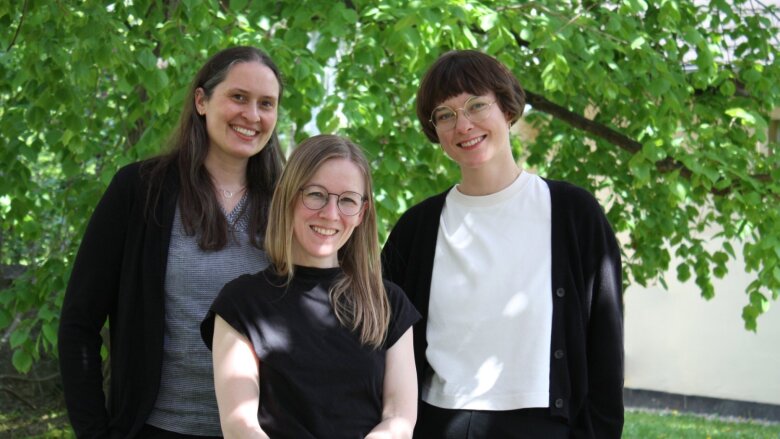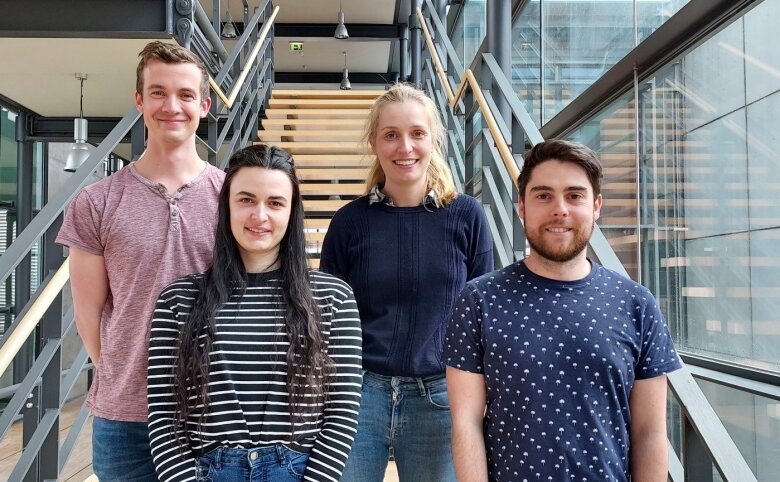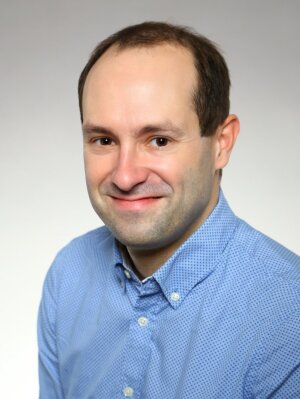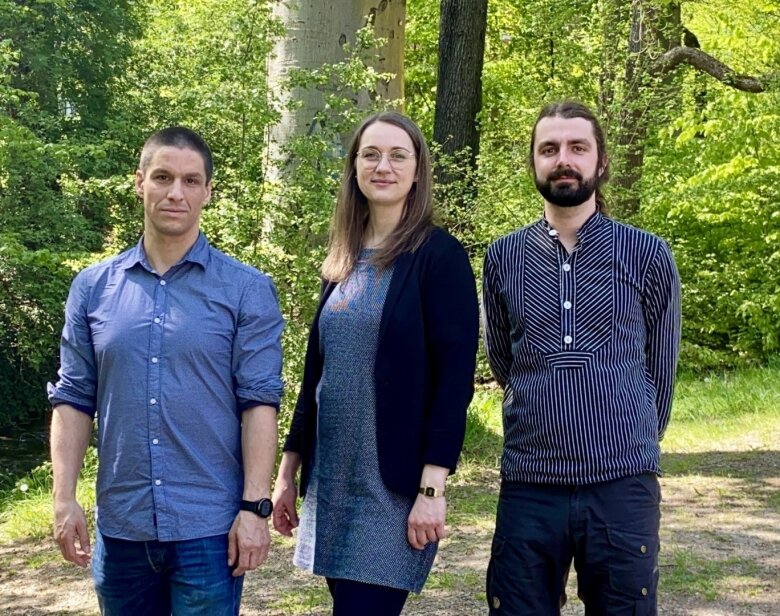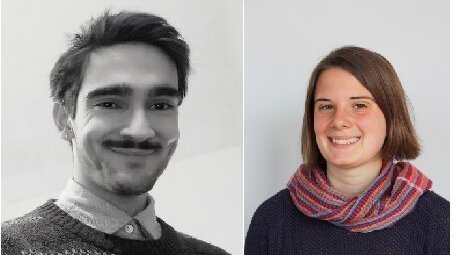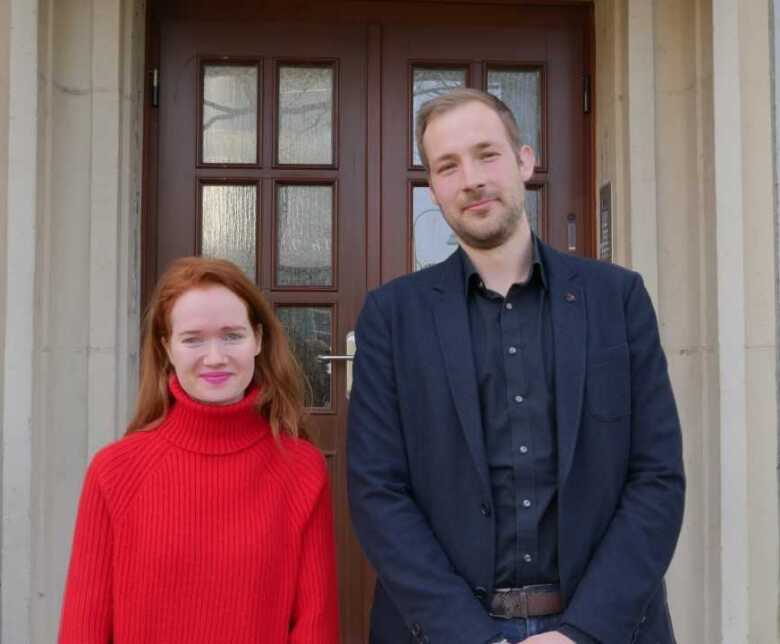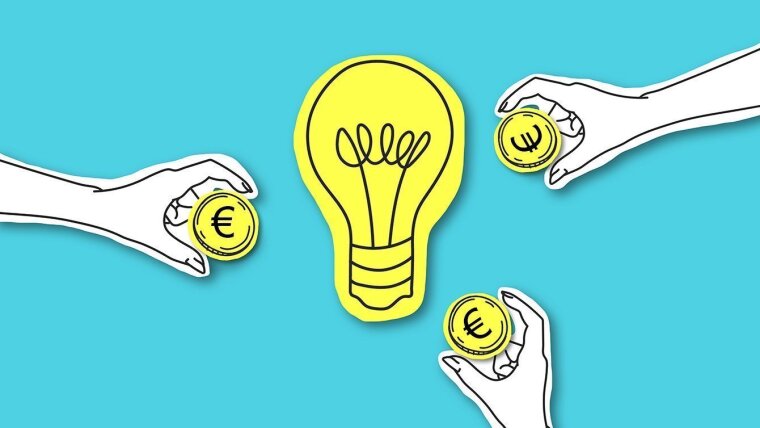
Since the start of the new edition of the funding programme in 2020, Jena Graduate Academy has already approved of 26 projects in which young teams of doctoral and non-doctoral researchers plan their own independent events. They funded events range from intensive workshops to international interdiscilinary congresses or public presentations. We present you with a few of these projects below.
Some of the events are semi-public or public. If you are interested in participating, please get in touch directly with the contacts listed there.
-
The Contribution of ART/HISTORY - Institute of Cultural and Fine Art Studies
left to right: Elisabeth Fritz, Michaela Mai, Ella Falldorf
Image: Sophie-Luisa HopfThe Contribution of ART/HISTORY to the Formation, Discussion and Negotiation of Social Issues
Project team:
Dr. Elisabeth Fritz (Scientific Assistant and Habilitation Candidate at the Chair of Art History, FSU Jena)
Michaela Mai (Research Assistant and Doctoral Candidate at the Chair of Art History, FSU Jena)
Ella Falldorf (Doctoral Candidate at the Chair of Art History, FSU Jena)The event will shed light on the potential of artistic and art historical impulses for public discourses in two ways: it will not only ask about the social effects of artistic practices, but also how the scientific discipline of art history itself contributes to current political debates - for example, by opening up new objects, organising exhibitions or initiating artworks in public space. The central premise here is that art cannot simply be used to 'persuade' people to adopt certain views, but rather challenges them with its own means to engage in critical debate, differentiated discussion and reflected judgement in the face of complex social problems.
The lectures are dedicated to historical and current case studies from the artistic, art historical and curatorial context as well as theoretical formulations of the 'contribution of art/history'. In the context of a panel discussion, the symposium will also be enriched by the perspective of contemporary artists.
Type of event
Symposium and panel discussion with artists
Registration
Public event (free of charge, no registration required)
Contact: elisabeth.fritz@uni-jena.de
Date and place
20-21 May 2022, Rosensäle of the Friedrich Schiller University Jena (large conference room)
Programme: https://www.kuk.uni-jena.de/lehrstuhl-fuer-kunstgeschichteExternal link
-
2022 Jena RNA Club Symposium - Institute of Microbiology
left to right: Eric Ruhland, Laura Vogt, Kathrin Fröhlich, Manuel Velasco Gomariz
Image: Kathrin Fröhlich„2022 Jena RNA Club Symposium“
Project team:
Dr. Kathrin Fröhlich (Junior Research Group Leader)
Eric Ruhland (Ph.D. Candidate)
Manuel Velasco-Gomariz (Ph.D. Candidate)
Laura Vogt (Ph.D. Candidate)Ribonucleic acids (RNA) not only serve as carriers or transcripts of genetic information, but also have far-reaching structural and regulatory functions. RNA is a comparably simple but at the same time universal macromolecule, and for this reason it is also of interest to different natural sciences from the respective point of view. In order to network the large number of scientists working on or with RNA in Jena, Dr. Kathrin Fröhlich, as co-initiator of the "Jena RNA Club", has been organising a monthly seminar series since the end of 2021. At this event, which currently regularly attracts over 50 participants, working groups from various faculties of the FSU (Biosciences, Chemistry-Geosciences, Mathematics and Computer Science), the Jena University Hospital and several non-university institutions (Hans Knöll Institute, Fritz Lipmann Institute, Friedrich Loeffler Institute) present their research results related to RNA and provide an insight into the methods used in each case.
The previous seminars of the "Jena RNA Club" have so far only taken place virtually. However, the interest in an intensive exchange between the individual participants and in expanding the event by including guest lectures became clear in this format as well. For this reason, our team, the junior research group "RNA Biology of Bacteria" at the Institute of Microbiology, would like to organise a meeting at which both representatives of the local research groups and guest speakers from the various disciplines present their work.Type of event
Conference with approx. 50 participants
Registration
semi-public event (registration required)
Date and venue
September 2022, (to be announced) Auditorium of the Haus zur Rosen of the Friedrich Schiller University Jena
-
'Sustainability' and 'Digitalisation' in school development processes - Chair of Business Education
Tobias Geisler
Image: Anne Günther (University of Jena)Implementation of the
Standard vocational education and training positions 'Sustainability' and 'Digitalisation' as an
impulse generator for school development processes (in vocational schools)Project team:
Dr. Tobias Geisler (Research Assistant at the Chair of Business Education, FSU Jena)
Leonie Biffar (Research Assistant at the Chair of Business Education, FSU Jena)
Falko Schmidt (Ph.D. Candidate at the Chair of Business Education, FSU Jena)Based on the educational policy steering instrument of standard vocational training positions, vocational schools are called upon to integrate binding, competence-related minimum standards for the areas of 'digitalisation' and 'sustainability' into their school curricula. This 'school-related curriculum work' requires on the one hand a professionalisation of the educational actors, and on the other hand structural changes are necessary at the level of school and educational process development. The topics are currently being discussed in vocational and business education research and in education administration (Bader 2020, BIBB 2021) - a transfer to educational practice at VET schools is still pending.
For this reason, the symposium invites not only academic guests but also active players from the school management level of vocational schools in Thuringia. Through their participation, they will actively influence the results of the exchange and enable the transfer of these results from practice to science and back. The invited guest speakers are recognised academic experts in the fields of sustainable development and digitalisation in vocational education and training.Type of event
Symposium with two guest lectures followed by an exchange forum.
Registration
Semi-public event (registration required)
Date and venue
October 2022, (to be announced) Auditorium of the Haus zur Rosen of the Friedrich Schiller University Jena
Translated with www.DeepL.com/Translator (free version)
-
Young researchers in bioactive glasses - Otto Schott Institute of Materials Research
left: Dr. Kristin Griebenow, right: MSc. Zhaorui Jin
Image: Delia Brauer“Young researchers in bioactive glasses and bioactive glass applications”
Project team:
Dr. Kristin Griebenow (Postdoctoral Researcher in Group Prof. Delia Brauer)
M.Sc. Zharoui Jin (Ph.D. Candidate at Otto Shott Institute for Materials Science, Group Prof. Delia Brauer)In recent years, the research of bioactive glass has made great progress in theoretical and technological aspects as well as in the identification of potential applications. Young researchers contributed significant investigations. This event is aimed at helping young researchers in the field of bio glasses to expand their research related network. The exchange of recent investigations and projects and the discussion of challenges can assist young researchers in creating alternative research ideas and discover new research possibilities.
This two-day event will take place in early September. The planned speakers and participants are predominantly international young researchers working in Italy, Slovakia, Great Britain, or Germany. There will be an additional online presentation from a Chinese colleague currently working in Xi’an Jiaotong University. The speeches will mainly focus on the background of bioglass, glass preparing technology and research of applications. The presentations will be broadcasted live via Zoom so that any interested students and researchers can participate in the meeting.
The first afternoon is especially reserved for networking, including a visit of the city center of Jena. This will provide a good opportunity for the participants to get acquainted in a less formal environment.
Type of Event
Symposium and Networking Event
Registration
Semi-public event (registration required)
Date and Venue
06 - 07 September 2022, Auditorium of the Haus zur Rosen of the Friedrich Schiller University Jena, Johannisstrasse 13, 07743 Jena
Contact: kristin.griebenow@uni-jena.de , zhaorui.jin@uni-jena.de
-
"Data visualisation of panel and life history data" - Institute of Sociology
left to right: Björn Seipelt, Agnieszka Althaber, Ralf Minor
Image: Anne Günther (University of Jena)Method workshop on quantitative data ananalysis:
„Data visualisation of panel and life history data“Project Team:
Dr. Agnieszka Althaber (Postdoctoral Researcher at Friedrich-Schiller-Universität Jena, SFB294-Project „Property Inequality in the Private Sphere“ (B06))
Björn Seipelt (Doctoral Candidate, Sociology, Friedrich-Schiller-University Jena)
Ralf Minor (Doctoral Candidate, Sociology, Friedrich-Schiller-University Jena)
Workshop for the further training of mid-level staff in the social sciences who work with quantitative data. The event is also embedded in the peer exchange between the three applicants and a guest scientist.
The training focuses on graphical analysis and presentation of quantitative research results, which is becoming increasingly important at conferences and for successful publications in relevant journals. The funded workshop thus promotes central methodological competences to young researchers and at the same time supports the expansion of international scientific cooperation. It leads to the development of current knowledge of data visualisation and opens up potentials for the implementation of new research projects based on the acquired know-how.
The workshop will take place over two days on the premises of the institute, preceded by a short digital work phase. The focus will be on the integration and creation of interfaces to other statistical software packages, the production of advanced data visualisation of longitudinal data as well as the production of interactive graphics.The training will be led by Paul Bauer (University of Mannheim), who has extensive experience in the implementation of data visualisation projects (https://github.com/paulcbauer) and also teaches these in the context of the training courses of GESIS Leibniz Institute for the Social Sciences. The workshop and its integration into the peer exchange will be organised jointly by the applicants.
Type of event
2-day workshop and networking event
Registration
non-public event (registration required)
Date and location
13-14 September 2022, location t.b.a.
-
Political Philosophy and the History of Violence - Institute of Philosophy
l. to r.: Danilo Gaijic, Hannah Peaceman
Image: privatPolitical Philosophy and the History of Violence
Workshop and book launch with Prof. Dr. Iris DärmannProject Team:
Dr. Hannah Peaceman (Postdoctoral Grant at Institute of Philosophy, Friedrich Schiller University Jena)
Danilo Gajic, M.A. (Doctoral Candidate at Institute of Philosophy, Friedrich Schiller University Jena)Iris Därmann's book entitled "Undienlichkeit - Gewaltgeschichte und politische Philosophie" (Undienability - History of Violence and Political Philosophy) is not only a cultural studies study, but also deals with a research desideratum in political philosophy. On the one hand, it works out how philosophy and specifically individual philosophers themselves have contributed to the justification of violence. On the other hand, she embarks on a search for traces of practices of resistance, including those for which previous political philosophy seems to have neither attention nor concepts. Därmann's historical contextualisation of the tradition of European political philosophy and the "West" is an important contribution to the current debate on philosophy and racism as well as anti-Semitism, which is also being conducted at the Institute of Philosophy at the Friedrich Schiller University of Jena.
During the workshop on 22 November 2022, we would like to discuss her findings and theses with Ms Därmann and interested students and staff. On the basis of selected book chapters, we would like to deepen the discussion about the relationship between philosophy and the history of violence.
This will be followed by a book presentation at 6 pm, to which we cordially invite students, staff and interested members of the public.
The venue and exact times will be announced here as soon as they are known.
Type of event
1-day workshop and public book presentation
Registration
Partly public event (registration required)
Date and venue
22 November 2022, Institute for Philosophy, Friedrich Schiller University Jena
Registration for the workshop is requested: hannah.peaceman@uni-jena.de
-
29th JOE Conference - Imre Kertész Kolleg Jena
Veronika Pfeilschifter, Immo Rebitschek
Image: Anne Günther (University of Jena)29th JOE Conference ("Tagung junger Osteuropaexpert*innen")
Project Team:
Dr. Immo Rebitschek (Postdoctoral Researcher at Imre Kertész Kolleg and Chair of Eastern European History)
Veronika Pfeilschifter (Doctoral Candidate & Research Associate at Institute for Caucasus Studies (Friedrich-Schiller-University Jena)The JOE conference, which has been held regularly since 1996, takes place under the patronage and professional supervision of the German Society for Eastern European Studies (DGO) and the Research Centre for Eastern Europe at the University of Bremen. Further cooperation partners this year are the Center for Governance and Culture in Europe at the University of St. Gallen and the Ernst Abbe Foundation.
The event offers 36 young national and international junior researchers (primarily doctoral students) the opportunity to exchange and network across disciplines and to receive constructive feedback on their ongoing research projects. The young researchers will present their projects in twelve thematically grouped panels. These panels will be commented on by established scientists. This year's panel topics include Eastern Europe in the Early Modern Period, the Russian Tsarist Empire as a field of conflict and object of memory, facets of protest and mobilisation in Eastern (Central) Europe and political developments in the South Caucasus. The JOE conference specifically opens up the opportunity to make creative and innovative research approaches known to a wider audience and to further develop and deepen them. Participation in the panels is reserved for presenters and commentators and is not open to the public.
In addition to the individual panels, the conference offers participants and the interested public the opportunity for exchange beyond the university circle within the framework of two evening events. This year, among other things, a panel discussion on the topic of positionality in science and a film festival are planned. More information will be published soon at https://dgo-online.org/kalender/berlin/2022/29-tagung-junger-osteuropa-expert-innen-joe/. Registration for the public events is not possible.
By organising the conference, Rebitschek and Pfeilschifter will have the opportunity to expand their existing networks and contribute their professional expertise as moderators and discussants on the panels. Last but not least, by organising the conference they will gain valuable experience in the management of third-party funds and event organisation.
Type of event
2-day conference and public evening events
Registration
non-public event
Date and venue
1 to 3 July 2022, Friedrich Schiller University Jena, Auditorium zur Rosen
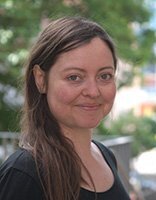
Johannisstraße 13
07743 Jena Google Maps site planExternal link
